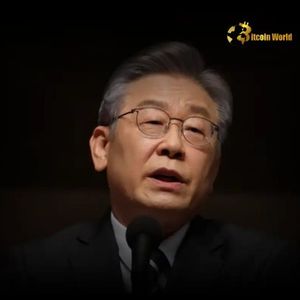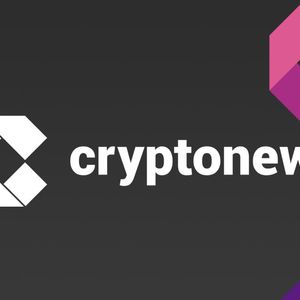Ambitious South Korea Digital Asset Exchange Plan Unveiled by Presidential Candidate Lee
5 min read
BitcoinWorld Ambitious South Korea Digital Asset Exchange Plan Unveiled by Presidential Candidate Lee Big news from South Korea! A significant move is potentially on the horizon for the country’s burgeoning digital asset market. Reports indicate that a major political party is championing the creation of a national digital asset exchange. This isn’t just another crypto platform; it’s a strategic proposal aimed at bringing digital assets squarely into the regulated financial system. Exploring the National Digital Asset Exchange Proposal According to an exclusive report by Seoul Economic Daily, the Democratic Party of Korea (DPK) is actively working on plans to establish a national digital asset exchange . This initiative is being spearheaded by none other than Lee Jae-myung, the DPK’s presidential candidate, as a key part of his campaign platform. The idea is to create a centralized, government-backed, or at least government-influenced, platform for trading various digital assets. Think of it as a potential cornerstone for the future of regulated digital finance in the country. Instead of leaving the digital asset space entirely to private entities, this proposal suggests a more direct involvement from the state and established financial players. Who’s Behind This Potential Exchange? The proposed structure for this South Korea digital asset exchange is quite interesting. It’s envisioned as a collaborative effort, likely operated by a consortium. This consortium would reportedly include: Regional Governments: Bringing a local, public interest perspective. Commercial Banks: Integrating traditional financial expertise and infrastructure. Global Cryptocurrency Platforms: Leveraging existing technology, liquidity, and global reach. Each of these entities would hold an ownership stake, suggesting a shared responsibility and a broad base of support intended to ensure stability and compliance. This multi-stakeholder approach could potentially bridge the gap between the innovative, fast-paced world of crypto and the more cautious, compliance-focused realm of traditional finance and government. What Assets Will Be Traded? A primary goal of this national digital asset exchange is to facilitate the trading of specific types of digital assets under a regulated framework. The plan explicitly mentions bringing several categories into this new system: Won-based Stablecoins: Digital currencies pegged to the value of the South Korean won. This is a significant focus, likely aimed at providing a stable, regulated digital medium of exchange linked directly to the national currency. A regulated Korean won stablecoin could potentially be used for payments, settlements, and trading on the exchange. Real-World Assets (RWAs): Tokenized representations of tangible or intangible assets from the physical world, such as real estate, art, commodities, or intellectual property. Tokenization can make these assets more liquid and accessible to a broader range of investors. Security Tokens (STs): Digital tokens that represent ownership in an asset (like stocks, bonds, or real estate) and are subject to securities regulations. This aligns with the goal of bringing traditional financial concepts into the digital realm in a compliant manner. By focusing on these specific asset classes, the DPK and Lee Jae-myung crypto plan aim to create a regulated environment for digital finance that interacts directly with the real economy and traditional investment structures. Why is Regulation a Key Focus? The push for a regulated crypto South Korea environment is a central theme of this proposal. The DPK plans to use the national exchange as a tool to achieve this. Bringing assets like won stablecoins, RWAs, and security tokens onto a regulated platform offers several potential benefits: Investor Protection: Implementing regulatory oversight can help protect investors from fraud and market manipulation, building confidence in the digital asset space. Financial Stability: Integrating digital assets into the existing financial system under regulation can help manage systemic risks. Market Legitimacy: A regulated exchange can lend credibility to digital assets, potentially encouraging broader institutional and public adoption. Taxation and Compliance: A regulated platform simplifies tracking and reporting for tax purposes and ensures compliance with financial laws. This regulatory drive reflects a global trend among governments seeking to harness the potential of digital assets while mitigating associated risks. For Lee Jae-myung crypto policy seems to be about control and integration rather than outright prohibition. What Does This Mean for the Future of Digital Assets in South Korea? The proposal for a national digital asset exchange could have profound implications. It signals a potential shift towards a more centralized and regulated digital asset ecosystem in South Korea. While existing private exchanges operate under certain regulations, a national platform with government and bank involvement would represent a significant escalation in official engagement. The focus on a Korean won stablecoin within this framework is particularly noteworthy. It suggests an interest in developing a digital currency closely tied to the national economy, potentially complementing or interacting with future central bank digital currency (CBDC) efforts. Challenges remain, of course. Establishing such a consortium and building the necessary infrastructure will be complex. Navigating the interests of regional governments, banks, and global crypto firms requires careful negotiation. Furthermore, the reaction from existing private crypto exchanges and the broader crypto community will be a critical factor in the proposal’s success. However, the fact that a major presidential candidate is putting such a plan forward highlights the growing importance of digital assets in the national conversation and the potential for significant regulatory and structural changes in the market. Concluding Thoughts The proposal for a national digital asset exchange in South Korea, championed by presidential candidate Lee Jae-myung, is a bold move that aims to reshape the country’s digital asset landscape. By bringing together government, banks, and global platforms, and focusing on assets like won stablecoins, RWAs, and security tokens, the plan seeks to create a robust, regulated environment for digital finance. While the path forward involves considerable challenges, this initiative underscores the increasing recognition of digital assets at the highest levels of government and signals a potential future where digital finance is deeply integrated with the traditional financial system under comprehensive regulation. It’s a development worth watching closely as South Korea navigates the future of money and assets. To learn more about the latest crypto market trends, explore our article on key developments shaping digital asset institutional adoption. This post Ambitious South Korea Digital Asset Exchange Plan Unveiled by Presidential Candidate Lee first appeared on BitcoinWorld and is written by Editorial Team

Source: Bitcoin World



